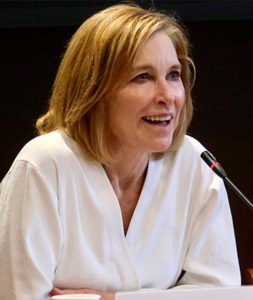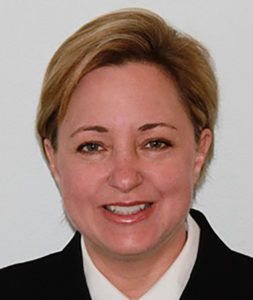Presidential Column
Finding Opportunities in Research Administration

“I wasn’t just an administrator shuffling paper. Instead, it’s about focusing on where research needs to be now and in 5 or 10 years. How do I build initiatives? How do I get leadership support? So, I wasn’t thinking about what research design can answer a specific study question. Instead, it’s a kind of visioning, what are the most important questions that science needs to answer?”
Dr. Christine Hunter, PhD, in clinical psychology, Former Acting Director, Office of Behavioral and Social Sciences Research, NIH

Graduate training in psychology largely prepares students to take academic positions despite the fact that over half of psychology PhDs take jobs and work in nonacademic settings. How do students prepare for and find the right jobs? Training programs vary in how much career planning they provide, but when surveyed, recent science PhDs reported that this is something they wanted more of. They wanted to know what careers are out there and how they can plan for them. They also wanted more training in broader job skills, like time management, working on a team, and managing others.
But many of the skills learned in graduate school—beyond content expertise in one’s own research specialty—transferred to their future jobs. Recent science PhDs reported that their jobs required skills—such as gathering, analyzing, and interpreting information, oral and written communication, decision-making and problem-solving, creativity, and goal setting— that they learned in graduate school. These skill sets were important for all positions, including research-adjacent jobs that don’t involve conducting research but instead disseminating it through science media, applying it in industry, and managing it for government research programs and funding organizations.
I had the opportunity to talk about jobs in research administration with Dr. Christine Hunter, who served as Acting Director of the Office of Behavioral and Social Sciences Research at the National Institutes of Health (NIH). Below is an excerpt of our discussion about how students can prepare for such jobs in research administration.
WENDY: What were your initial plans for your career when you were in graduate school? What was your thinking at that time about what you would do with your degree?
CHRISTINE: So, I got a clinical psychology degree, and I thought I wanted to mix science and practice. I imagined being in a system where I advise lots of other practitioners, with a bit of a research role. Maybe a hospital academic setting where I was practicing? That’s what I thought I was going to do.
WENDY: When did your plans shift, and how did you think about it at the time? What led you to make the change away from these standard careers for clinical psychologists?

CHRISTINE: Internship. I had some friends in my PhD program that had gone into the Air Force through their internship program. And they just had rave reviews about the internship training they received. I interviewed with the Air Force for their internship, and it kind of felt like a perfect match. I would get to see all kinds of different patients. They encouraged research and I could get my license, my supervised time, and have a secure job. It seemed like a pretty good deal, and it was.
Then I got an opportunity to shift from clinical care and do some policy and research work in the Air Force. I really loved it. I liked the 10,000-foot view. Even though I didn’t get to be totally hands-on or see everything to fruition, I felt like I was having a broader impact. So, maybe I didn’t get to manage every detail of a research study from beginning to end, but I had breadth of engagement as I could be involved in multiple studies. I loved that I could learn all kinds of new things, that I didn’t necessarily have to have one lane of expertise. I was in the Air Force for 10 years and thought that’s how I’d continue: being in the Air Force.
Then out of the blue I got an email. Somebody at NIH contacted me and asked, “Hey, would you be interested in interviewing for a program officer position?” He described the job, and I thought, “Oh, this sounds perfect.” It was a 10,000-foot view job on a different scale. I would get to work with junior and senior investigators and help craft the vision for where the institute would go scientifically.
And so, he said, “Will you come for an interview?” And I said, “Sure.” It was a great match, and they offered me the job. If I had known how hard it is to get a job at NIH, I would have been a ball of nerves, but I didn’t know. I was just taking it as, “Hey, I already have a job I like so I am not risking much by interviewing.” I am so glad it worked out. I was at the National Institute of Diabetes, Digestive and Kidney Disease (NIDDK) as a program officer for 11 years and loved it.
Read all of the articles from the November/December Observer.
WENDY: So, this was a shift to a completely research-adjacent position, where you get to direct research efforts, but you were no longer doing hands-on work with patients, clients, or research studies.
CHRISTINE: At NIH, as a program officer, you can have a tiny bit of hands-on research, but yes, most wasn’t direct research. NIH program officers are actively a part of grant management and defining research priorities. If you are a part of a cooperative agreement, you are a research partner and you have a say, but it is not the same as running a research project.
WENDY: What you are describing is what we train psychology PhDs to do—to think conceptually and systematically. And I always think that students who are graduating underestimate these skills. They don’t realize that these are tangible, important skills that allow you to lead in organizations and direct strategy and research efforts.
CHRISTINE: I agree. I think that the critical thinking skills I acquired in graduate school and beyond as a clinical psychologist have been crucial. It means thinking like a scientist, thinking about what the gaps are, thinking about how to justify why something is important or needed, and doing that in a data-driven way. That’s how we were trained. So, I think these research leadership roles fit well with my training.
WENDY: I think students will appreciate hearing that they’re learning something useful. Students sometimes question if they’re not using the specific disciplinary content of what they studied in graduate school—attention, addiction, or whatever—whether graduate school is a waste of time. What would you say to that?
CHRISTINE: I don’t think it’s a waste. I think I just took a different path. I got board certified in clinical health psychology, and I had expertise in certain conditions, approaches, and whatnot. What I found exciting was taking those same principles, that same critical thinking, and being able to be a jack of all trades. How do I apply my understanding of human behavior to multiple conditions, settings, and sets of populations? So, I didn’t have the depth of knowledge in everything but, over time, could be pretty facile in talking about everything from basic social and behavioral science to implementation science. This was because I understood the key principles and how to think about research. So, I don’t think that it’s a waste. That background training fully supported me taking a less traditional path.
WENDY: Yes, it’s sort of what I tell the students in my lab. They can learn a lot even if they decide that they don’t like a topic and end up switching focus. They still can gain great experience doing research, and that knowledge transfers to new settings, topics, and questions. So, it sounds like a similar argument—graduate training teaches high-level skills like how to approach a research question to identify a potential answer.
CHRISTINE: So, as an example, when I went to NIDDK, I was the director of behavioral research for diabetes and obesity. I had some knowledge of diabetes, but I wasn’t a diabetes expert. One of the things that they asked was, “Is that going to be a problem?” I was confident that it was not going to be a problem. I understood behavior change. I understood behavior change principles. I understood a lot that was highly relevant to managing diabetes. I was going to have to get up to speed on the specifics with diabetes, how it works, and the psychosocial issues but the way I was trained left me confident I could switch gears. Then when I changed jobs again and moved to the Office of Behavioral and Social Sciences Research at NIH, people said, “How can you give up your focus on obesity and diabetes?” For me, it was ok to make the switch because what I love most is behavioral and social science applied to solving important challenges to health. I loved the work on diabetes and obesity, but it was never about those conditions alone. It was about addressing behavioral and social factors that impact health.
WENDY: That’s a helpful perspective in identifying the skills that students gain in graduate school that apply broadly. Is there anything that you didn’t learn that you wish you had in graduate school?
CHRISTINE: I feel proud of my training overall, but they could have focused more on leadership, management, and administrative skills that are useful to move up the chain and supervise multiple people. These skills are important in clinical settings, too; a psychologist might be supervising multiple master’s level practitioners or junior PhDs. I don’t feel like they talked about how to apply behavioral and social science to the practice of leadership. It was all about the science, the data, and the methods but less about how you can be successful in running a lab, an office or a department. My school could have done a better job with that type of training but, in the end, you also need to be prepared to learn on the job.
WENDY: Yes, these are important skills. Even more so now, given team science with diverse people working on large, funded projects that require experts from multiple domains. So, I agree that those skills are important for all PhDs to learn, but these often aren’t taught much in graduate programs.
But psychology students do get great training in methods and data analysis. Did you use these skills in your positions? Students are sometimes given advice that if they want to get a nonacademic job, then this is the one skill set they can develop that’s highly marketable.
CHRISTINE: Yeah, I did early on, on some of my own research projects. But the more senior I got, the more I turned the analysis over to people who made it their whole lives. Data analysis was never my passion but having that background allowed me to be a good consumer of data and a critical thinker to evaluate the papers that were coming out. I really valued having that baseline expertise, but I never thought about it as my primary or most marketable skill.
WENDY: Is there any advice you want to give students as they decide what to pursue in the job market? Students can take so many different avenues, in policy, industry, tech, teaching. And a clinical degree like yours opens up yet another branch of opportunities. What would you tell folks to pay attention to?
CHRISTINE: You have to think about how many hours you spend at work. It would be tough not to enjoy it and feel like it’s meaningful. It’s important to carefully think, am I doing this because it’s the accepted path—one that my major professor would most understand and approve. Why am I doing it? So, I think it’s a matter of thinking about what you would really enjoy versus what is the expected path.
WENDY: So, tell us something about the hiring process. I guess that you interviewed a lot of new PhDs for NIH? What did you look for in job applicants for research administration?
CHRISTINE: Yes, I did quite a bit of hiring. I mostly hired folks to fill health science policy analyst and science administrator positions at NIH. Sometimes, I would interview people who are more senior, but often it would be people who are a couple of years post PhD.
What did I look for? Critical thinking and flexibility. If they had only one specific topic that they loved, then that’s the only thing that they would want to focus on. You know, if they said, “Prostate cancer is my life,” then I knew they weren’t going to be happy with a broad portfolio made up of different research topics that was the focus of our office. They could be great for other program officer positions at NIH but not for our office.
I looked for people who were curious, energetic, with demonstrated capacity to be self-starters. Not just waiting to be delivered a project, but to be able to think, “Gosh, I see the gap and want to figure out different ways to tackle it.” When they say in an interview, “I identified a problem, this is how I went about addressing it, and this is the difference it made,” it was always reassuring. I was looking for people who have history of, and could talk about, how they identified a need in administration or research and proactively went about solving it and bringing teams together—having those examples is important in an interview.
WENDY: That’s great advice. So, is there anything else that you think would be helpful for students to know, especially for those who are thinking about a job in research administration?
CHRISTINE: Ask questions and be curious. Ask—”What’s a day in your life as a X look like/what are the priorities in your job?” A lot of people would be happy to talk with students about what a career at NIH looks like. Also, recognize that if you ask one person, you’ve got one person’s point of view. So maybe ask a few, so you can get different perspectives. Get a feel for why folks took that career path, and what they love about it. I loved my job. I was very excited by it, but I recognize it might not be for everybody. And that’s okay. As I said before, I think it is very important to find work that you find engaging and meaningful.
Feedback on this article? Email [email protected] or login to comment. Interested in writing for us? Read our contributor guidelines.





APS regularly opens certain online articles for discussion on our website. Effective February 2021, you must be a logged-in APS member to post comments. By posting a comment, you agree to our Community Guidelines and the display of your profile information, including your name and affiliation. Any opinions, findings, conclusions, or recommendations present in article comments are those of the writers and do not necessarily reflect the views of APS or the article’s author. For more information, please see our Community Guidelines.
Please login with your APS account to comment.